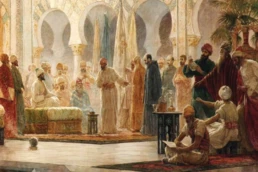6 min read
I rail against paternalistic Eastern (Arab and Asian) superiority and the infantilization of Muslim westerners. To be clear, this isn’t to negate the obvious fact that there are scholars in the Middle East nor that we cannot benefit from the good it has to offer (like anywhere else), but I’m briefly addressing an ongoing presumption amongst many Muslims in the west that eastern is better merely because it is eastern. This is in some part built on a fetishization of the Middle East and particularly by those who don’t have any actual experience of what education there is like. For many, it is a mystic land in which scholars attend mosque circles in all their regalia and scholarly glory, ruminating deeply on the Quran, hadith, fiqh, usūl, aqīdah, kalām, etc. Yet this depiction couldn’t be further from the truth.
There is nothing intrinsic to Arabness that elevates the Middle East’s ability to engage in Islamic scholarship at a higher level. In fact, Islamic history attests to the fact that Islamic intellectual development, in all shar’ī realms was mostly the domain of non-Arabs. Ibn Khaldun famously wrote:
“A wonderous fact is that the bearers of knowledge in the Islamic religion are vastly ajam (non-Arabs). There aren’t bearers of knowledge from the Arabs in either the Islamic disciplines nor the intellectual ones except a rare few, and even if some might be of Arab descent they are ajam in their language, socialisation, and teachers, although the religion and the representative of its sharī’ah is Arabian!”
Now I wouldn’t go as far as Ibn Khaldun, people from all nations have contributed to the stock of Islamic knowledge. But some might wonder: how does that work – surely the Arab understands what is in his language better than the non-Arab?
Well that’s not true. Look at it the other way. Many foreign students from the east come to the UK to study western disciplines and excel far greater than their western classmates. And in the context of shar’ī learning, it’s often overlooked that Arabs in the Middle East do not innately speak Classical Arabic, they too study it. Nor are they born with an intrinsic knowledge of revelation; they too learn it. A great irony in the current outlook is that the majority of early Islamic scholars were not Arabs, that’s to say, Islamic knowledge over a millennium is built on the back of those native to other than Arab lands. Simply considering most of the jurists (fuqaha), muhaddithīn and mufassirīn (exegetes) of Islam suffices to realise this. And this wasn’t a later development but from the age of the tābi’īn. Ibn salah narrates in his Muqaddimah that al-Zuhrī relates:
I arrived at (the Umayyad caliph) Abdul Mālik b. Marwān. He asked: “Where have you come from Zuhrī?” I said: “From Makkah.” He said: “Who did you leave behind to lead its people?” I said: “Atā’ b. Abī Rabāh.” He asked: “Is he from the Arabs or the Mawālī (converted non-Arab Muslims)?” I said: “From the Mawālī.” He asked, “What did you leave him in leadership of?” I said: “Religion (diyānah) and narrating it (riwāyah).” He said: “The people of religion and narration ought to lead.”
He asked, “Who leads the people of Yemen?” I said: “Tāwūs b. Kaisān.” He asked: “Is he from the Arabs or the Mawālī?” I said: “From the Mawālī.” He asked, “What did you lead him in leadership of?” I told him what I had told him of Atā’. He said: “Yes it ought to be (that way).”
He asked, “Who leads the people of Egypt?” I said: “Yazīd b. Abi Habīb.” He asked: “Is he from the Arabs or the Mawālī?” I said: “From the Mawālī.”
He asked, “Who leads the people of the Levant?” I said: “Mak’hūl.” He asked: “Is he from the Arabs or the Mawālī?” I said: “From the Mawali: a former Nubian slave who was freed by a woman from the Hudhail tribe.”
He asked, “Who leads the people of Jazira?” I said: “Maimūn b. Mahrān.” He asked: “Is he from the Arabs or the Mawālī?” I said: “From the Mawālī.”
He asked, “Who leads the people of Khurasān?” I said: “Dah’hāk b. Muzāhim.” He asked: “Is he from the Arabs or the Mawālī?” I said: “From the Mawālī.”
He asked, “Who leads the people of Basra?” I said: “Hasan b. Abi Hasan.” He asked: “Is he from the Arabs or the Mawālī?” I said: “From the Mawālī.”
He said: “Woe to you, who leads the people of Kufa?” I said: “Ibrahīm al-Nakha’ī.” He asked: “Is he from the Arabs or the Mawālī?” I said: “From the Arabs.” He said: “Woe to you Zuhrī, you’ve given me some solace; by God you will place the Mawālī as masters over the Arabs!” I said: “Leader of the Faithful, it is the affair of God and His religion, whoever protects it leads and whoever disregards it falls.”
There are scholars everywhere who prove relevant to their people, and one can find specialists in the unlikeliest of places. And my point here isn’t to say that any group/nation/ethnicity is better than any other – knowledge is a human endeavour and of course, easterners are as much a part of that endeavour as westerners. Yet balance is lost and apparently, with all of our advancements in the west, and our development in knowledge (all realms) we’re still considered by some of our own and others to be unable to adequately grasp shar’ī disciplines. In fact, western Muslims can theorise on quantum physics, microbiology, or deep matters related to historiography, epistemology and formal logic, and we have some of the best universities in the world, yet the (purposefully) simple Qur’an and sunnah is apparently beyond us.
I believe we live in social and political environments that are far more conducive to the development of unhindered shar’ī thought than most places in the Middle East. It is a travesty that many Muslims in the west go looking east for their faith, assuming they’ll routinely find something deeply sophisticated in the deserts of the Sahara, the towns of Arabia, or the cities of the Asian subcontinent. Yet I and other western colleagues are contacted by people from the Middle East for fatwas and shar’ī explanations. When I’ve asked why they’re contacting me as opposed to those where they are, they respond that many of their scholars seem to have become beset by groupthink, parochial and shallow understandings of revelation (things of course that can also be found in the west), or pontificate based on the political interests of their leaders, all of which is impeding the progression of their societies. Whilst we look east, the younger generations (with the help of technology and expanding English literacy) are starting to find us. (It’s also a bit like when Arabs come to London and can’t understand why some non-Arab Muslims are dressed like them, whilst they’re in jeans and jumpers!)
This is not a lamentation nor am I personally affected, and of course, people are free to do as they choose. My overarching point is about the way Muslim westerners hinder themselves. How we learn and study things is dictated by context, i.e. what it will be used for. So if you go looking for a relatable model of islam (subservience to God) in the desert or some village (out of fetishization), or you appropriate understandings from regions that are alien to your context, you can’t be surprised when it then doesn’t seem to correlate with modern western living and you’re left with internal dissonance.
For some of us this might be uncomfortably challenging, but for others it’s been obvious for a quite a while.
Related Posts
3 Comments
Add comment Cancel reply
This site uses Akismet to reduce spam. Learn how your comment data is processed.





I couldn’t agree more Shaykh!
Well, when it comes to language and perhaps culture too the Arabs have a definite advantage. But scholarship is not about language only. Non-Arabic speakers can have greater depth and breadth of knowledge. Sometimes they may even be more intelligent.
However one thing is historically true. Muslims made spectecular progress in secular knowledge under the Abbasid and the Spanish Ummayad regimes. Once the political leadership went over to the non-Arabs, the Ottomans, Safavids, and the Mughals pursuit of knowledge came to a virtual halt. So I can’t say whether Arabs are better scholars but once they certainly excel in fostering an environment conducive to scholarship. Why?
Thank you Shahid, but that’s actually not true. The Ottomons and Mughals literally carried the Hanafi school of law (as well as many other Islamic disciplines) and most of what Hanafi’s study today was under their care. As for the regimes, my point wasn’t about political leadership but intellectual leadership and the way many today underplay non-Arab scholars.